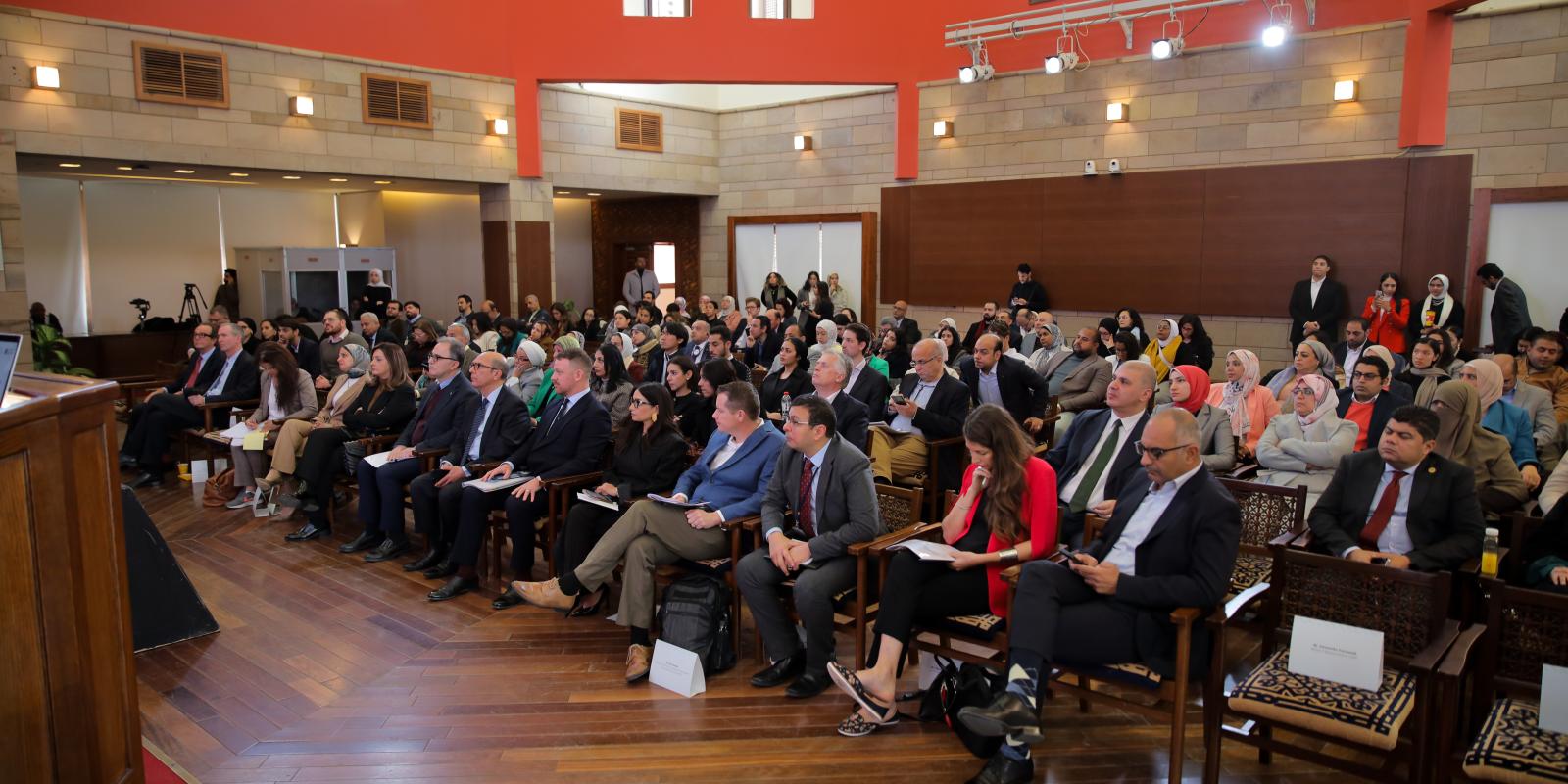
J-PAL MENA at AUC Unveils HAPIE: A Bold Step Toward Environmental Transformation in Egypt
The Abdul Latif Jameel Poverty Action Lab Middle East and North Africa at The American University in Cairo (J-PAL MENA at AUC) has unveiled a new initiative designed to address Egypt’s pressing environmental issues: HAPIE (Hub of Advanced Policy Innovation for the Environment).
HAPIE is a bold new initiative aimed at fostering sustainable solutions for clean air and water. The launch event took place on February 18, 2025, in the hybrid presence of key figures, including H.E. Rania Al-Mashat, Egypt’s minister of planning, economic development and international cooperation, and Nobel laureate Esther Duflo; co-founder of J-PAL.
A New Era of Environmental Policy
HAPIE, with a name inspired by the ancient Egyptian deity associated with the Nile’s annual flooding, is an extension of the Egypt Impact Lab (EIL), which has already proven invaluable in applying evidence-based policy to a variety of sectors. This new initiative is poised to tackle climate change by focusing on environmental issues, with a particular focus on improving air and water quality. By bringing research and real-world policy closer together, HAPIE will enable impactful change in Egypt’s environmental landscape.
The event marked the beginning of a transformative partnership between The Abdul Latif Jameel Poverty Action Lab Middle East and North Africa (J-PAL MENA) and the Ministry of Planning and Economic Development, alongside a coalition of influential partners like Community Jameel and the Sawiris Foundation for Social Development.
"At the Ministry of Planning, Economic Development and International Cooperation, we recognize that transformative change must be rooted in evidence-based and data-driven policymaking, strategic partnerships and innovative financing mechanisms. The Hub of Advanced Policy Innovation for the Environment (HAPIE) accelerates this vision by creating a dynamic platform where research can directly inform policy action and financing decisions. This synergy is in line with the ministry’s Framework for Sustainability and Financing for Economic Development, ensuring that evidence-based policies drive inclusive sustainable growth and deliver a measurable impact for Egypt’s future," said H.E. Al Mashat, highlighting the importance of evidence-based policymaking.
Empowering Change Through Collaboration
Sherifa Sherif, executive director of the National Institute for Governance and Sustainable Development, spoke to the vital role of environmental policy innovation in governance. “By placing environmental policy innovation as a cornerstone of governance, we are reinforcing our commitment to a greener future for all Egyptians. This Hub offers hope, driving evidence-based strategies to tackle issues like air and water quality and moving us closer to our sustainable development goals. I applaud the efforts that made this possible and eagerly anticipate its positive impact on Egypt’s governance and sustainable development.”
The commitment to turning research into actionable policy is echoed by Ahmed Elsayed, executive director of J-PAL MENA, who shared: “This partnership underscores our commitment to employing rigorous research to address critical environmental challenges and create a substantial impact in Egypt. I am enthusiastic about the potential of HAPIE to address air and water policies in Egypt and drive positive change and development in the future.”
A Global Perspective with Local Impact
The project’s reach extends beyond Egypt. HAPIE is the regional counterpart of a global network of Air and Water Labs (AWLs) in India and South Africa. These labs have already proven successful in their own countries by driving forward data-driven policies that target critical air and water issues. As part of this network, HAPIE will work closely with government partners in Egypt to develop locally relevant solutions with global impact.
“Egypt is a country of wide, open skies and the great River Nile – but they are menaced by climate change, pollution and other threats. Together with J-PAL, the Ministry of Planning, Economic Development and International Cooperation, and a consortium of partners in this project, Community Jameel is committed to ensuring that the new Hub of Advanced Policy Innovation for the Environment – as part of the global network of J-PAL Air and Water Labs – will put scientific evidence at the heart of the government’s efforts to ensure a safe and healthy environment, with access to clean air and water, for all Egyptians,” stated George Richards, director of Community Jameel.
Innovating for Egypt’s Future
The launch of HAPIE is more than just a new platform – it’s a long-term investment in the country’s future. “At Sawiris Foundation, our commitment goes beyond financial support—we strive to be impact investors, developmental knowledge leaders, and technical partners dedicated to creating meaningful change. Through continuous learning and innovation, we work to design and implement effective interventions that address the most pressing challenges facing our communities,” said Laila Hosni, executive director of the Sawiris Foundation.
As Egypt navigates the challenges of climate change, HAPIE represents a critical tool in shaping a future where sustainable development, clean energy, and economic growth go hand-in-hand.
The Road Ahead
With its research-driven approach and close collaboration with government agencies and international partners, HAPIE is poised to play a pivotal role in Egypt's battle against climate challenges. By grounding environmental policy in scientific research, this initiative is set to catalyze actionable, impactful solutions that will not only enhance the quality of Egypt’s air and water, but also contribute to the nation’s broader environmental and economic objectives.
As Egypt continues its path toward sustainability, HAPIE stands as a powerful reminder of the role that innovation, research, and collaboration play in building a greener, more sustainable future for all.
For more information, visit the HAPIE website.
